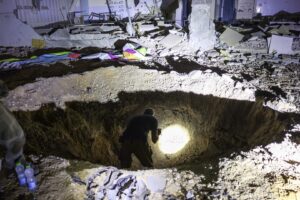The north connects the Mediterranean to the Middle East. The west anchors a transatlantic bridge. To keep these essential commons free and open, the transatlantic community must find common ground with Türkiye, Israel, Saudi Arabia, Qatar, UAE, and Egypt, as well as interested partners in the Indo-Pacific such as India, Japan, South Korea, and Taiwan. The only options are to work together or watch everything get worse.
Sad State of Moscow
Undeterred by its failing war against Ukraine, Moscow is determined to show the regime remains a “great power” by meddling in other places where the price of entry for troublemaking is lower and the opposition less attentive. Moscow is involved in the Sudan civil war. The leader of the Rapid Support Forces, Hemeti, has ties to the Wagner Group.
It is no secret that Russia wants to grab Sudanese gold to help finance its war in Ukraine. In return, Russian mercenaries have reportedly supplied missiles to the RSF through military bases in eastern Libya, which is a stronghold of Gen. Khalifa Haftar. Haftar is supported by the Wagner Group. A brigade of the Sudanese RSF was sent to support him during his 2019 military offensive against the Tripoli government.
But the Kremlin’s reach extends even further. Russian influence over the Sahel region grows. Mali is slipping into Moscow’s orbit. Burkina Faso’s interim leader Ibrahim Traore called Russia a “strategic ally.” And according to press reports, the Wagner Group is recruiting rebels in Chad to overthrow the local government.
Beijing Aggressive
China has been particularly active on the commercial front, signing several agreements in the phosphate and fertilizer sector in Algeria, Egypt, and Morocco. In March, the Suez Canal announced a $2 billion deal with Chinese firm Xinxing Ductile Iron Pipes Corporation to build a steel factory. Beijing has signed agreements with Rabat and Algiers on the Belt and Road Initiative.
Xi Jinping met the Tunisian president, Kais Saied, and the two leaders pledged to further strengthen relations between China and Tunisia. These initiatives are buying Chinese influence, not just doing business. They often spread political interference, corruption, and debt as much as paychecks.
Tunisia has become the poster child of how Beijing takes advantage of underperforming regimes. Hit by a serious economic crisis, Tunisia faces significant instability. The International Monetary Fund has delayed a $1.9 billion loan, demanding reforms that Saied does not want to implement. This situation will lead the Tunisian president to link arms with Russia and China or bring back to power the Ennahda movement which is linked to the Muslim Brotherhood and Hamas. Neither outcome will make the region better.
Being a Better Neighbor
The West can do better than offer interference that fosters corruption, violence, exploitation, misery, and great-power bullying. The problem is the West is not taking action. The U.S., for instance, is more focused on repurposing the President’s Emergency Plan for AIDS Relief (PEPFAR), established in 2003, as a tool for pressing alien ideologies (e.g., expanding abortion practices) in Africa. Dumping aid and lecturing countries never works well, and using that approach to counter Russia and China is like challenging Godzilla with a butter knife. This nonsense must stop.
Italy’s conservative government, led by Giorgia Meloni, has a keen interest in stabilizing North Africa to avoid a migration crisis and counter Sino-Russian infiltration. The European Union has launched initiatives. But the U.S. and its partners in Europe, the Middle East, and the Indo-Pacific must do a better job of synchronizing efforts.
The right vehicle might be a G7-plus format with all partners bringing to the table their best ideas for punishing the most egregious behaviors of Russia and China and working with African governments interested in delivering peace, prosperity, and security to their people.
Source : The Heritage Foundation
















